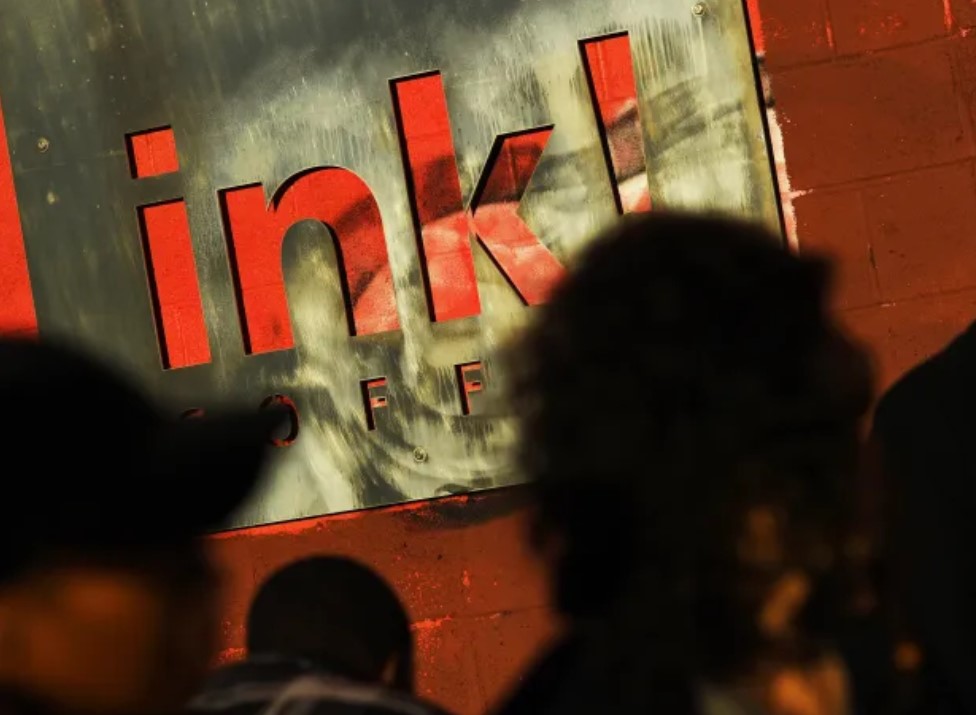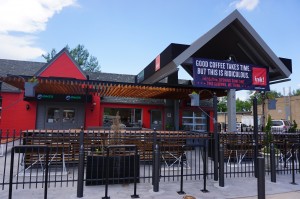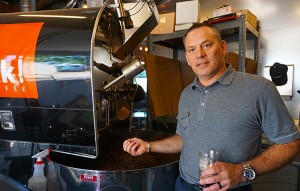
People protest outside Ink after the company displayed a sign celebrating gentrification in Denver’s RiNo neighborhood on Nov. 27, 2017. (RJ Sangosti, The Denver Post)
Bruised by Denverites’ post-pandemic reluctance to return to offices, Ink Coffee has gone from a 16-location success story with $5 million in annual revenue to a bankrupt company of four cafes that could soon be sold for $300,000 — a price some see as “artificial.”
“The COVID-19 pandemic turned off its business like a light switch,” its lawyers say.
Ink began in 1994 when a self-described ski bum named Keith Herbert returned from Italy, where he’d learned to make coffee, and began selling it from a steel cart in Aspen. Ink found greater success in Denver, peddling caffeine to workers in the city’s office districts.
In a moment of ill timing, the company borrowed $2 million for an expansion in December 2019. A few months later, the pandemic snatched away its customer base downtown.
Ink closed most locations, laid off employees, raised prices, eliminated menu items and received pandemic-era aid. But none of it “changed the reality that the office workers that kept many of (Ink)’s retail locations alive did not return to the office,” its lawyers say.
“Since 2020, changes in the local economy, including a massive increase in wages, difficulty finding employees, and substantial increases in the cost of goods, among others, further squeezed Ink Coffee’s finances,” those attorneys wrote in a Sept. 30 court filing.
By 2023, the company was still borrowing money to remain afloat and began looking for a buyer. A marketing firm came up with a list of 89 prospects. Only one was interested.
Chris Leevers’ family runs Leevers Supermarkets, which is based in Castle Rock and operates more than 50 grocery stores around the country. Those are mostly Save-A-Lots, a discount grocer, but also include Leevers Locavore on West 38th Avenue in Denver.
Chris Leevers, who did not respond to requests for an interview, is offering $300,000 for Ink: $100,000 in cash and $200,000 in credits for money he has loaned or will soon loan the company. Closing is set for Halloween, assuming a bankruptcy judge signs off on it.
Leevers’ plan to buy Ink through his firm Boria Capital is not without its detractors. Among them: The U.S. Trustee’s Office, which is a branch of the federal government, and Newtek, a lender owed $1.6 million from Ink. Both take issue with Leevers’s use of $200,000 in credits.
“Boria appears to be engaging in a ‘loan-to-own’ strategy, and this credit bid appears motivated to dissuade other prospective buyers from coming to the table,” Newtek told U.S. Bankruptcy Judge Kimberley Tyson last month. It doesn’t believe the credits should count.
By using a so-called credit bid, Leevers is setting the purchase price at $300,000 and requiring other prospective buyers to post more cash than that if they are to top his bid. Newtek and the U.S. Trustee’s Office believe that has “chilled the bidding process,” they’ve told Tyson.
Ink “has already detailed its tortured efforts in rallying interest for the purchase of its business and the credit bid’s artificial inflation of the stalking horse bid from $100,000 to $300,000, for Boria’s exclusive benefit, would only exacerbate the problem,” Newtek warned.

Ink Coffee’s location at 709 S. University Blvd. in the Bonnie Brae neighborhood. (BusinessDen file photo)
Tyson has not ruled on the credit bid debate or scheduled a hearing for discussing it.
Ink’s four locations are in the Cherry Creek Shopping Center, the 1801 California skyscraper, National Jewish Health and at 709 S. University Blvd. It has a roastery in Aurora.
The company, which is down to 26 employees, lost money in its most recent reporting month. Ink took in $265,000 during August and spent $282,000. It had $72,000 in bank accounts, $97,000 in unpaid bills and projected it would lose another $55,000 in September.
Ink’s bankruptcy lawyers are Andrew Johnson and Gabrielle Palmer with Onsager Fletcher Johnson in Denver. Herbert, its founder, did not answer requests for an interview.

People protest outside Ink after the company displayed a sign celebrating gentrification in Denver’s RiNo neighborhood on Nov. 27, 2017. (RJ Sangosti, The Denver Post)
Bruised by Denverites’ post-pandemic reluctance to return to offices, Ink Coffee has gone from a 16-location success story with $5 million in annual revenue to a bankrupt company of four cafes that could soon be sold for $300,000 — a price some see as “artificial.”
“The COVID-19 pandemic turned off its business like a light switch,” its lawyers say.
Ink began in 1994 when a self-described ski bum named Keith Herbert returned from Italy, where he’d learned to make coffee, and began selling it from a steel cart in Aspen. Ink found greater success in Denver, peddling caffeine to workers in the city’s office districts.
In a moment of ill timing, the company borrowed $2 million for an expansion in December 2019. A few months later, the pandemic snatched away its customer base downtown.
Ink closed most locations, laid off employees, raised prices, eliminated menu items and received pandemic-era aid. But none of it “changed the reality that the office workers that kept many of (Ink)’s retail locations alive did not return to the office,” its lawyers say.
“Since 2020, changes in the local economy, including a massive increase in wages, difficulty finding employees, and substantial increases in the cost of goods, among others, further squeezed Ink Coffee’s finances,” those attorneys wrote in a Sept. 30 court filing.
By 2023, the company was still borrowing money to remain afloat and began looking for a buyer. A marketing firm came up with a list of 89 prospects. Only one was interested.
Chris Leevers’ family runs Leevers Supermarkets, which is based in Castle Rock and operates more than 50 grocery stores around the country. Those are mostly Save-A-Lots, a discount grocer, but also include Leevers Locavore on West 38th Avenue in Denver.
Chris Leevers, who did not respond to requests for an interview, is offering $300,000 for Ink: $100,000 in cash and $200,000 in credits for money he has loaned or will soon loan the company. Closing is set for Halloween, assuming a bankruptcy judge signs off on it.
Leevers’ plan to buy Ink through his firm Boria Capital is not without its detractors. Among them: The U.S. Trustee’s Office, which is a branch of the federal government, and Newtek, a lender owed $1.6 million from Ink. Both take issue with Leevers’s use of $200,000 in credits.
“Boria appears to be engaging in a ‘loan-to-own’ strategy, and this credit bid appears motivated to dissuade other prospective buyers from coming to the table,” Newtek told U.S. Bankruptcy Judge Kimberley Tyson last month. It doesn’t believe the credits should count.
By using a so-called credit bid, Leevers is setting the purchase price at $300,000 and requiring other prospective buyers to post more cash than that if they are to top his bid. Newtek and the U.S. Trustee’s Office believe that has “chilled the bidding process,” they’ve told Tyson.
Ink “has already detailed its tortured efforts in rallying interest for the purchase of its business and the credit bid’s artificial inflation of the stalking horse bid from $100,000 to $300,000, for Boria’s exclusive benefit, would only exacerbate the problem,” Newtek warned.

Ink Coffee’s location at 709 S. University Blvd. in the Bonnie Brae neighborhood. (BusinessDen file photo)
Tyson has not ruled on the credit bid debate or scheduled a hearing for discussing it.
Ink’s four locations are in the Cherry Creek Shopping Center, the 1801 California skyscraper, National Jewish Health and at 709 S. University Blvd. It has a roastery in Aurora.
The company, which is down to 26 employees, lost money in its most recent reporting month. Ink took in $265,000 during August and spent $282,000. It had $72,000 in bank accounts, $97,000 in unpaid bills and projected it would lose another $55,000 in September.
Ink’s bankruptcy lawyers are Andrew Johnson and Gabrielle Palmer with Onsager Fletcher Johnson in Denver. Herbert, its founder, did not answer requests for an interview.

